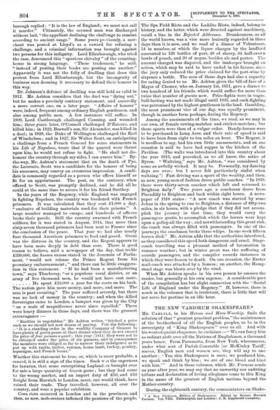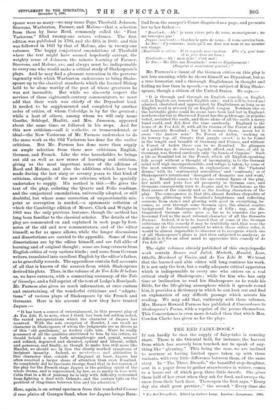THE NEW VARIORUM SHAKESPEARE.*
MR. CARLYLE, in his Heroes and Hero-Worship, finds the solution of that " greatest practical problem," the maintenance of the brotherhood of all the English peoples, to be in the sovereignty of " King Shakespeare" over us all. And with his wonted quaint eloquence, he exclaims :—" We can fancy him as radiant aloft over all the Nations of Englishmen, a thousand years hence. From Paramatta, from New York, wheresoever, under what sort of Parish-Constable [or McKinley Tariff; soever, English men and women are, they will say to one another Yes, this Shakespeare is ours ; we produced him, we speak and think by him ; we are of one blood and kind with him.' " And in these volumes, which Mr. Furness sends us year after year, we may say that no unworthy nor unfitting tribute and declaration of loving allegiance come to this King in the name of the greatest of English nations beyond the Mother-country.
During the eighteenth century, the commentators on Shake-
• d New Variorum Edition of Shakespeare. Edited by Horaoe Howard Burnam. VoL VIII. Philadelphia and London : J. B. Lippincott company,
speare were so many—we may name Pope, Theobald, Johnson, Steevens, Warburton, Farmer, and Malone—that a selection from them by Isaac Reed, commonly called the " First Variorum," filled twenty-one octavo volumes. The first edition was published in 1793, and the fifth in 1803; and this was followed in 1821 by that of Malone, also in twenty-one volumes. The happy conjectural emendations of Theobald where the text might have seemed hopelessly corrupt, the weighty sense of Johnson, the minute learning of Farmer, Steevens, and Malone, are, and always must be, indispensable to every one who would make a critical study of Shakespeare's plays. And he may find a pleasant recreation in the perverse ingenuity with which Warburton endeavours to bring Shake- speare up to the classical standards which the learned Bishop held to be alone worthy of the poet of whose greatness he was not insensible. But while we sincerely respect the services of these eighteenth-century commentators, we must add that their work was chiefly of the Dryasdust kind.
It needed to be supplemented and completed by another order of critics, of whom Coleridge is by far the greatest ; while a host of others, among whom we will only name Goethe, Schlegel, Hazlitt, and Mrs. Jameson, appeared about the same time, or followed in his steps. And for this new criticism—call it aesthetic, or transcendental, or ideal—the New Variorum of Mr. Furness undertakes to do the same work as the Old Variorum has done for the earlier criticism. But Mr. Furness has done more than supply an ample selection from these new criticisms, English, German, and French. Like the wise householder, he brings out old as well as new stores of learning and criticism, giviUg us the most important notes of the editions of Reed and Malone, and also the additions which have been made during the last sixty or seventy years to that kind of criticism, alongside of the new criticism which he specially undertakes to supply. His method is this :—He gives the text of the play, collating the Quarto and Folio readings, and the conjectural emendations, universally adopted, or still doubtful, but where some correction of unquestionable mis- print or corruption is needed,—a systematic collation of which the Cambridge edition of Messrs. Clark and Wright in 1863 was the only previous instance, though the method has long been familiar to the classical scholar. The details of the play are commented on and explained in each page by foot- notes of the old and new commentators, and of the editor himself, so far as space allows, while the longer discussions and dissertations are carried to the appendix. Some of these dissertations are by the editor himself, and are full alike of learning and of original thought ; some are long extracts from English critics of very various kinds ; and some from German writers, translated into excellent English by the editor's father, as he gracefully records. The appendices contain full accounts of all that is known of the sources from which Shakespeare derived his plots. Thus, in the volume of As You Like It before us, we have extracts, with a connecting summary, of the Tale of Gamelyn, and a full reprint of the text of Lodge's Rosalyncle. Mr. Furness also gives us much information, at once curious and entertaining, of the wonderful criticisms and "adapta- tions" of various plays of Shakespeare by the French and Germans. Here is his account of how they have treated Jaques :-
" It has been a source of entertainment, in this present play of As You Like It, to note, what I think has been but seldom noted, the varied interpretations which the character of Jaques has received. With the sole exception of Hamlet, I can recall no character in Shakespeare of whom the judgments are as divers as of this ' old gentleman,' as Audrey calls him. Were he really possessed of all the qualities attributed to him by his critics, we should behold a man both misanthropic and genial, sensual and refined, depraved and elevated, cynical and liberal, selfish and generous, and finally, as though to make him still more like Hamlet, we should see in him the clearly marked symptoms of incipient insanity. Indeed, so mvsterioas and attractive is this character that, outside of England at least, Jaques has often received a larger share of attention than even Rosalind. So completely did he fascinate George Sand that in her version of the play for the French stage Jaques is the guiding spirit of the whole drama, and is represented, by her, as so madly in love with Celia that in a fit of jealousy he is only with difficulty restrained from fighting a duel with Orlando, and the curtain falls on the prettiest of ring-times between him and his adoration."
Here, again, is an actual specimen from this wonderful Comme ii room plaira of Georges Sand, when her Jaques brings Rosa- lind from the usurper's Court disguised as a page, and presents her to her father :— "Rosalinde.—Ah ! je veux vivre pros do vous, monseigneur ; ne me renvoyez pas !
Jaques (souriant).—Gardez-le prls de vous ; it vous servira bien. Le Dttc.—J'y consens; mais qu'il me dise son nom et me montro son visage. (Rosalial se reljce. Il la regarde avec .!motion. Elle ley peut tenir it se jette duns ses bras.)
Rosaiiiide.—Ah ! mon pore ! c'est inoi !
Le Duc.—Ma fille, ma Rosalinde ! sous co d6guisement ! (Surprise et ntouventent Oruira/.) "
Mr. Furness's e,.:r...ount of the German critics on this play is not less amusing, while he shows himself no Dryasdust, but as a true humorist, and a thorough Englishman in thought and feeling no less than in speech,—a true subject of King Shake- speare, though a citizen of the United States. He says :— " It is through and through an English comedy, on English soil, in English air, beneath English oaks ; and it will be loved and admired, cherished and appreciated, by Englishmen as long as an English word is uttered by an English tongue. Nowhere else on the habitable globe could its scene have been laid but in England, nowhere else but in Sherwood Forest has the golden age, in popular belief, revisited the earth, and there alone of all the earth a merry band could, and did, fleet the time carelessly. England is the home of As You Like It, with all its visions of the Forest of Arden and heavenly Rosalind ; but let it remain there ; never let it cross the narrow seas.' No Forest of Arden, rocking on its towery top, all throats that gurgle sweet,' is to be found in the length and breadth of Germany and France, and without a Forest of Arden there can be no Rosalind. No glimpses of a golden age do German legends afford, and time, of old in Germany, was fleeted carelessly only ' by bands of Gypsies.' Such a life as Rosalind led in the Forest, which all English-speaking folk accept without a thought of incongruity, is to the German mind well nigh incomprehensible, and refuge is taken, by some of the most eminent Germans, in explanations of the Pastoral drama,' with its sentimental unrealities' and contrasts,' or of Shakespeare's intentional disregard of dramatic use and wont,' &c., &c. Rosalind ceases to be the one central figure of the play, her mirth and jests lose all prosperity in German ears, and Germans consequently turn to Jaques and to Touchstone as the final causes of the comedy and as the leading characters of the play. The consequence is, that this almost flawless chrysolite of a comedy, glittering with Rosalind's brightness and reflecting sermons from stones and glowing with good in everything, be. comes, as seen through some German eyes, the almost sombre background for Shakespeare's display of folly ; nay, one dis- tinguished German critic goes so far as to consider the pro- fessional Fool as the most rational character of all the Dramatis Persorue. Indeed, it is to be feared that of some of the German criticisms on this comedy it may be truthfully said, that were the names of the characters omitted to which these critics refer, it would be almost impossible to discover or to recognise which one of all Shakespeare's plays is just then subjected to analysis ; so difficult is it for an alien mind to appreciate this comedy of As You Like It."
The eight volumes already published of this encyclopaedic work contain Romeo and Juliet, Macbeth, Hamlet, Lear, Othello, Merchant of Venice, and As You Like it. We trust that the learned and able editor will long continue his work. It is not only the best, but a really adequate critical apparatus which is indispensable to every one who enters on a real critical study of Shakespeare ; while for him who has only time or inclination to read his Shakespeare as he reads his Bible, for the life-giving atmosphere which it spreads round him, it provides a dictionary in which he can look out and find an explanation of any difficult passage which arrests his reading. We may add that, uniformly with these volumes, Mrs. Horace Howard Furness has published A Concordance to Shakespeare's Poems, with a reprint of the poems themselves. This Concordance is even more detailed than that which Mrs. Cowden Clarke has given us for the plays.























































 Previous page
Previous page